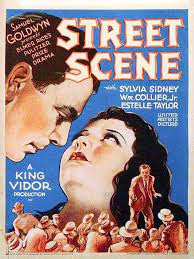(1931)
Directed by King Vidor
Written by Elmer Rice
Starring Sylvia Sidney, William Collier Jr., Estelle Taylor, David Landau, Beulah Bondi, Russel Hopton
IMDB Entry
The Hays code went into full effect in 1934 and its strict rules on what could be portrayed was a major limitation on the subjects of films until it was finally was dropped in 1968. It’s not that there weren’t good movies made while it was in effect, but it restricted subject matter, especially dealing with adult subjects. Street Scene dated from before the code, and is a strong drama dealing with subjects that the code wouldn’t allow.
The movie was based on a Pulitzer-Prize-winning play by Elmer Rice about a day in the life of the inhabitants of a single New York City tenement block. It’s a hot summer day, and Emma Jones (Beulah Bondi) is busy gossiping with the neighbors about what’s going on in the building. The chief gossip involves Anna Maurrant (Estelle Taylor), who is having an affair with the collector for the dairy, Steve Sankey (Russell Hopton). Anna’s husband Frank (David Landau) is suspicious. At the same time, their daughter Rose (Sylvia Sydney) is being pressured by her boss to quit her job and go on the stage. He even offers to set her up in an apartment. Rose wisely sees the offer for what it is and refuses, and is attracted to Sam Kaplan (William Collier, Jr.), even though there is a big hurdle: he’s Jewish.
The main story is spiced by little slice-of-life vignettes, sketching characters both good and bad. It all leads up to a tragedy, but life goes on in the street.
The ending is relatively advanced for its time, with the final shot showing Rose taking on an independent role.
Beulah Bondi holds the movie together. Her comments and explanations not only set up the various situations, but also act as a Greek chorus. This Bondi’s first film role after having played it on Broadway, and she went on to a long career as a character actress, usually playing mothers.*
Sylvia Sidney also had a long career, lasting into the 1990s.
King Vidor was no stranger to directing movies showing ordinary people. His The Crowd is considered one of the classics of silent film and he continued to direct successful films into the 1950s. Except for one scene in a taxi, everything takes place on the same set, as though it were a play on stage.
The movie got caught up when the Hays Office took over. It went into obscurity, so much so that many of the prints were lost. But it can be found now online at Archive.org.
__________________________________________________________
*Including George Bailey’s mother in It’s a Wonderful Life

No comments:
Post a Comment